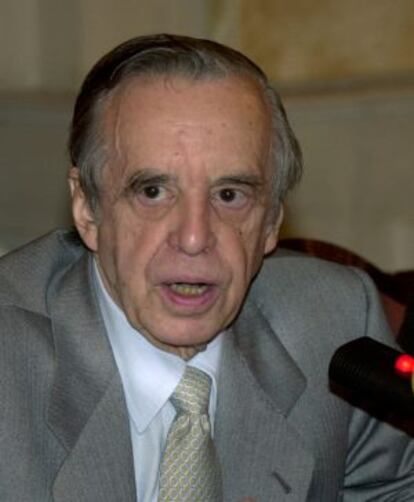New study of financing behind Spanish Civil War takes award
Book by former bank chief José Ángel Sánchez Asiaín National Prize for Spanish History

A new book that examines how both sides in the Spanish Civil War financed their respective forces - an aspect that is usually overlooked in studies of the 1936-39 conflict, which brought future dictator General Francisco Franco to power - has won this year's National Prize for Spanish History.
José Ángel Sánchez Asiaín, an academic and former bank chairman, has taken 20 years to write La financiación de la Guerra Civil española (or, The Financing of the Spanish Civil War), a book that was described by the prize jury as "a solid piece of research, well structured, and that opens new lines of research, provides new documentary evidence, and is the result of many years of work." The prize is worth 20,000 euros.
The book, which is aimed at the general reader, provides a detailed account of General Franco's preparations for the military uprising in July 1936, which was largely funded by Joan March, a Mallorca-based financier and founder of the Banca March.
Sánchez Asiaín then goes on to cover the Republican government's response to the war, including its efforts to rally funding internationally, as well as the decision to send 510 tons of gold - more than 70 percent of the country's reserves - to Moscow in the early months of the conflict.
The book also looks at the preparations made by opponents of Franco for exile, and how escape abroad was funded. It pays special attention to the changes that Franco made to Spain's financial system during the war, notably the decision to print a new currency, followed by a law passed in 1937 that allowed funds that were held in Republican areas and in the old currency to be converted.
Spain was effectively split into two economies during the conflict
Spain was effectively split into two economies during the conflict, with the workforce directed entirely toward providing resources for each side's war effort. Private investment came to a standstill.
The country faced huge problems when Franco's forces finally won in 1939, with no gold reserves and agriculture and industry left crippled. Later that year, Europe was plunged into World War II, effectively isolating the country for another five years.
Sánchez Asiaín was born in Vizcaya in 1929, and is a doctor of economics, as well as being a member of a number of academies in Spain. He is a former chairman of Banco Bilbao, which he joined in 1954. Following a series of mergers, the bank has since become BBVA. As the head of Banco Bilbao, Sánchez Asiaín oversaw the process of consolidation in the Spanish banking sector in the late 1980s, making a takeover bid in 1987 for Banesto.
The takeover bid failed, due to the refusal to agree to a deal by Banesto's then-head, Mario Conde, who would later be sent to prison for his mismanagement of the bank. Sánchez then decided to merge Banco Bilbao with its regional rival, Banco Vizcaya. This created BBV, and created a power struggle between the two banks for control over the new entity, which Bilbao eventually won. In 1999, BBV merged with the Argentaria bank, which then sparked a new internal conflict over management styles. Once again, Sánchez Asiaín emerged victorious in that particular battle.
Shortly after, Sánchez Asiaín stepped down as honorary president of the bank, and has since spent his time researching, as well as promoting the R+D activities of the Cotec Foundation, which he heads. He is also an active supporter of charities trying to tackle drug addiction.
Tu suscripción se está usando en otro dispositivo
¿Quieres añadir otro usuario a tu suscripción?
Si continúas leyendo en este dispositivo, no se podrá leer en el otro.
FlechaTu suscripción se está usando en otro dispositivo y solo puedes acceder a EL PAÍS desde un dispositivo a la vez.
Si quieres compartir tu cuenta, cambia tu suscripción a la modalidad Premium, así podrás añadir otro usuario. Cada uno accederá con su propia cuenta de email, lo que os permitirá personalizar vuestra experiencia en EL PAÍS.
¿Tienes una suscripción de empresa? Accede aquí para contratar más cuentas.
En el caso de no saber quién está usando tu cuenta, te recomendamos cambiar tu contraseña aquí.
Si decides continuar compartiendo tu cuenta, este mensaje se mostrará en tu dispositivo y en el de la otra persona que está usando tu cuenta de forma indefinida, afectando a tu experiencia de lectura. Puedes consultar aquí los términos y condiciones de la suscripción digital.








































